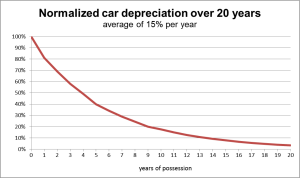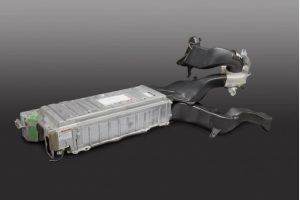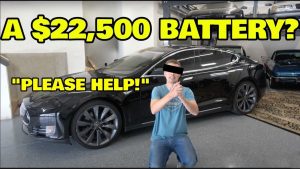No one ever saved money by spending it.
People who have money understand this principle – often having made a lot of it as salesmen, convincing other people of its opposite. The job of a salesman isn’t to save you money. It is to make money . . . by convincing you to buy something.
Like a hybrid or an electric car, for instance. There are many reasonable reasons for buying one or the other but don’t kid yourself that you’ll be saving money.
It is perfectly true that a hybrid car will save you money on gas – because it burns less of it. And it is true you’ll spend nothing on gas if you buy an electric car, which doesn’t burn any gas at all.
But what does all this “saving” cost you?
A new Toyota Prius hybrid stickers for $24,525. A new Toyota Corolla – which is otherwise similar – stickers for $20,075.
The Prius averages 56 MPG. The Corolla 33. On roughly 11 gallons of gasoline the Prius will go about 600 miles before it needs more gas. The Corolla can travel about 450 miles on 13 gallons (it has a slightly larger gas tank). Call it 400 miles to account for the additional two gallons of gas the Corolla’s larger tank holds.
So, the Prius goes about 200 miles farther on roughly the same quantity (about 11 gallons) of gasoline. You have saved about $19 – the cost of the roughly six gallons of gasoline (at about $3.20 per gallon) you didn’t have to buy. If you fuel up once a week, your savings per month amounts to about $76; over the course of a year, you will have saved about $912 on gas vs. what you would have spent to drive the Corolla the same distance. 
But you spent $4,450 more on the Prius, itself.
It will take you about 5-6 years of “saving” on gas to make that back. More than that, actually – because in addition to spending that $4,450 on the Prius, itself, you also probably paid more in taxes on the Prius – as taxes are based upon the purchase price/retail value of the vehicle. Also probably on insurance, which is based on the replacement cost of the vehicle. A vehicle with a higher replacement cost will usually cost more to insure.
There is also the cost of depreciation.
The Prius will have lost a proportionately greater percentage of its original value and if you think that doesn’t cost you money, think about it some more.
But these are incidental costs relative to the one that’s going to cost you the most, eventually. That being the cost of replacing the battery pack in the Prius.
At some point , the battery that is key to the hybrid’s gas mileage savings may no longer be holding as much charge as it was capable of holding when it was new. This is as inevitable as winter following fall.
You may get many years out of the battery before capacity degradation this becomes noticeable. But you are not likely to get the 15-20 years and more that you’re likely to get out of a Corolla before anything comparably costly requires replacement.
A used/refurbished battery pack for a Prius currently costs about $1,100 or so. It’s a cost you’ll pay either to keep the Prius “saving” you on gas – or a cost you’ll eat when you decide to sell/trade your tired-battery Prius, as dealers are well aware of the battery life problem and they aren’t going to fail to factor in to their offer what it’s going to cost them to put a a refurbished battery pack into your trade-in hybrid, in order to be able to re-sell it to someone else.
So, not counting the higher taxes on the purchase of the more expensive hybrid and the probably higher cost to insure it, you will have spent in the neighborhood of $5,550 to “save” on what you would otherwise have not spent at all on the Corolla.
The “savings” are probably worse than that, too, as Corollas routinely go for 20 years or longer before their owner is obliged to spend anything substantial to keep them going. And a mechanically sound 20-year-old Corolla is still a pretty safe bet for reliable service for many more years to come after that. It may need a new $100 starter battery at some point. But you can buy a lot of starter batteries for the cost of one hybrid battery.
Actually, you could buy about 340 gallons of gasoline. That’s enough to take you about 11,000 more miles down the road…
Electric cars are even more preposterous ways to “save.” You spend $10k-plus more to buy one and you’ll spend as much on a refurbished/replacement battery pack for one as you would have to buy the Prius over the Corolla. And the electric car’s battery will cost you more, sooner – because it has to work harder.
A hybrid’s battery never fully discharges. When its charge gets low, the gas engine/generator automatically re-instills charge. The battery is also more of a supplemental power source than the primary propulsion source. Most of the work of moving the car is done by the engine, which reduces the load on the battery.
EV battery packs do all the work. Well, they provide all of the power. And if you drive the EV to the edge of its range you will have deeply discharged the battery pack. Do this regularly and you’ll likely be spending more, sooner.
For a new battery pack.
And these packs – being larger and more powerful – are much more expensive than hybrid battery packs.
If you really want to save money, buy a used Corolla. It’s possible to pick one up for about the difference in price between a new Prius and a new Corolla plus maybe a little bit more. Put the $15-$20k or so you didn’t spend on the new either-of-them toward gas and you’ll never spend more to drive than the people who bought new think they’re “saving.”
. . .
Got a question about cars, bikes, or Sickness Psychosis? Click on the “ask Eric” link and send ’em in! Or email me at EPeters952@yahoo.com if the @!** “ask Eric” button doesn’t work!
If you like what you’ve found here please consider supporting EPautos.
We depend on you to keep the wheels turning!
Our donate button is here.
If you prefer not to use PayPal, our mailing address is:
EPautos
721 Hummingbird Lane SE
Copper Hill, VA 24079
PS: Get an EPautos magnet or sticker or coaster in return for a $20 or more one-time donation or a $10 or more monthly recurring donation. (Please be sure to tell us you want a magnet or sticker or coaster – and also, provide an address, so we know where to mail the thing!)
My eBook about car buying (new and used) is also available for your favorite price – free! Click here. If that fails, email me at EPeters952@yahoo.com and I will send you a copy directly!












Hi Eric,
It’s important to note that your Prius vs Corolla gas cost comparison is at best, a guesstimate. The price of gas at any point in the future is an unknown variable. So it’s impossible to accurately predict how much money a hybrid will or will not save you.
Probably, the price of gas will increase, a lot, in the future….and so will the cost of a hybrid replacement battery.
Gets complicated. 🙂
https://www.imdb.com/title/tt0082642/
I was reminded of this grade B movie with Lee Majors. 1981. Watched it when HBO was all that and was very young. Cheesy but has Burgess Meredith in it so there’s that.
“……In a future United States, the only transport available to an individual is public transportation. Predicated on an assertion that “the oil has run out”, an increasingly totalitarian central government has ordered all personal vehicles be impounded by law…..”
“Fuel savings” If you drive less than 500-700 miles a week it’s unlikely you’ll recoup the cost of a hybrid before it’s worn out or you’re sick of it. Until battery technology reaches sorcery level efficiency, charging times, and capacity ICE’s aren’t off the table. Sorry blackpillers you’re wrong. Raider Girl is correct.
Diesels are not what they used to be either. With uncle scam’s epa regs on modern diesels I think the repair/operating costs may offset the longevity and fuel econ factor to the point it zeros itself out. I’m seriously considering NOT making my next work van a diesel. I log about 35,000 MI a year so it’s currently worth it but these guys who get hit with repair bills in the thousands on a regular basis when the piss pump or dpf or fill in the____ acts up has me wondering.
Hybrids are a non starter for me
I am reaching the same conclusion. I was going to replace my truck with a diesel when it comes time (assuming there will still be real trucks then). With the increased cost of a diesel & lower projected service life due to emissions controls, I think I will go with a gasser.
My daily drivers all cost under $3,000. I can do most of the repairs myself, and those I can’t my local garage does. I’d never save enough on gas buying a newer car to pay for the repair costs that I would be unable to perform myself. Maybe that’s why they are forcing this sh*t on us; it’s harder to control the debt free who can fix almost everything they own on an income below the poverty line. Wasn’t it Shakespeare who said in Hamlet: “Neither a lender or borrower be”?
Eventually, gas will be hard to buy. Gas stations will be converted to convenient stores and charging stations. This will justify the few fueling stations left to raise the price of gas through the roof. Your gas powered vehicle will become worthless. Vehicles will be so expensive that the average American will become a serial leaser, never owning the vehicle. This what I believe will be our dark future. Eric, you basically predicted this year’s ago.
Eventually gasoline will be widely available on the black market. Dealers will be incarcerated, supplies confiscated, but it will make very little difference. Occasionally someone’s engine will blow up due to an incorrect mixture, and 80 years later we will learn that most of these occurrences were part of a government program to sow distrust and convince people to stop using ice cars. The victims will be considered collateral damage in the war on gas.
No way will fuel ever be squeezed out of the market, at least in this lifetime. I had a post the other day that listed Hollywood movies that came true. I would like to add another to the list…Cars.
There are too many other forces at work for America to determine the future of automobiles. Do you anticipate Russia, the Middle East, and Brazil to stand meekly by as Europe and the USSA shutdown these countries largest streams of revenue? I highly doubt Putin or the Crown Prince Mohammed Bin Salman will take lightly to the destruction of their oil reserves.
Also, let’s not forget that the USSA and Canada also happen to be the third and fourth largest petroleum exporters in the world. Only a fool will kill their cash cow. Then their are the partners of the WEF…BP, Chevron, Suncor, Occidental, Saudia Aramco, etc. Where’s Tesla? Exxon’s revenue will be $250 billion dollars in 2022. The largest is Saudi Aramco who averages $400 billion a year. The largest renewable energy source? Orsted has an annual revenue of $51 billion and a YTD loss of ($33 billion). It is not even close.
Wow! Losing 33 billions on renewable energy. What a return on your investment as a big big smile runs across my face!!!!!
Maybe.
But they will need to legislate and then force the existing fleet off the road.
We’ll go Cuba automotively first. People are going resurrect cars out of fields and junkyards. It’s already begun.
They can try to stop us from a variety of angles. But here’s another thing just about every gasoline vehicle can be converted to ethanol. Remember what happened the last time they tried to make ethanol illegal?
Wood powered cars have advantages over gas, diesel or electric vehicles.
The worst choice is electric vehicles.
There is lots of free wood someplaces, you can drive around the world with a saw and an axe.
In a very remote location this would be good, if there is lots of trees.
When/if they cut off our gas or diesel we can use these.
https://www.lowtechmagazine.com/2010/01/wood-gas-cars.html
Re: “People who have money understand this principle – often having made a lot of it as salesmen, convincing other people of its opposite. The job of a salesman isn’t to save you money. It is to make money . . . by convincing you to buy something.”
Eric, as always there are good and bad ‘salesman’. While I agree that the term usually is not looked upon favorably, please note that there are still some, what I like to call ‘Professional Salesman’, still out there. What that means to me is we are the middleman that puts together the end-user and the Manufacturer with products and services that do indeed help them with their goals. There are certainly bad salesman in my industry too. If you don’t sell to ‘make money’ but instead to solve problems and be the best middleman you can be, you add value to yourself, your customer, and your product. That’s the way it’s supposed to work, to me anyway.
I’ve even had the pleasure to work with but a few ‘professional’ car salesman. They added value to me, the product, and them. Very few left though.
I understand your premise though, just pointing out there are differences. Thanks
BTW, I saw there are a couple Chris’s posting so I’ve changed my name to ChrisIN, maybe you can tell via our email. Just FYI.
Economics and physics seem to have diverged at some point -likely due to them being different academic disciplines in what has become a compartmentalized ‘specialty’ world- but as this article eloquently illustrates, the two are intimately intertwined, to wit: It will ultimately require a given amount of energy to propel a given mass at a given speed over a given distance. Once relative efficiency is achieved, the only real savings in energy (and thus cost) that can be had is by reducing mass, speed or distance. Anything else will just be a trade-off in which one just reduces cost in one variable (like amount of gas used) only to transfer that cost to another metric (durability and or overall cost of entry, etc.) so at best, all one can achieve is a wash. In the real world, it is not even a wash, since a good ICE car can last 15-20 years quite easily…but the more expensive EV can’t.
I like the way this article ‘splains it better! 😀
Very well put, Nunzio. 🙂
All must relate to fundamental laws of nature.
Which, in this case, means Newton’s laws of motion coupled with fundamental laws of thermodynamics.
For starters:
https://en.wikipedia.org/wiki/Thermal_efficiency
>The second law of thermodynamics puts a fundamental limit on the thermal efficiency of all heat engines.
And then, as you have noted, we get into *economic* considerations, which determine, e.g., why we generally use copper for wiring, not gold or silver.
I think my spare relatively low miles (125K) 94-Corolla has actually gone *up* in value in the last 3-years.
But but but, we’re saving the planet! Good grief. The general public can’t even figure out the elementary school math of this simple comparison. Is it any wonder why they succumbed to a scary tale of an invisible (fake) virus, which, according to the propagandist’s own supposed data, has a survival rate in excess of 99%?
Once upon a time there was a scary gas called CO2, which is so bad it sustains plant life on the Earth. Mean people in their dirty cars (but not the military or other government departments) kept pumping this scary gas into the atmosphere, which was supposed to make sea levels rise, but didn’t. Then St. Musk, with the help of our benevolent overlords, created a car that would save the planet. The world lived happily ever after.
Once upon a time there was a big, bad, scary virus. . .
Right on, Mister!
Also: Per my back-and-forth with new poster Jack, the thing that really sticks in my craw is that we used to be able to buy highly efficient non-hybrids like the Geo Metro, the Honda CRX and many others, which approached or even matched the gas mileage achieved by today’s hybrids without resorting to expensive technological artifices. All that’s necessary to get a car to average 50-plus MPG is to make it light. That’s it. A car that weighs less than 2,000 pounds doesn’t need much engine and that not-much-engine doesn’t need much gas to move the car along.
With the Prius and other hybrids, you have needlessly overteched systems which are necessary to overcome the weight. And – kick to the balls – the stupid thing is heavy precisely because it is a hybrid.You are lugging around probably 800 or so pounds of deadweight… take that off and you don’t need to stupid battery/motor to average 50 MPG.
Part of the range problem is that it takes additional energy to carry around more batteries.
As a gas tank empties it gets *more* efficient because it’s no longer carrying around the gas that’s already been used…
(Law of diminishing returns applies)
The safety cult demands conformity, that vehicles be designed to protect occupants in crashes. The only form of avoiding collisions is through automation. Not better headlamps, improved handling, better brakes, or anything like that. But through taking control away from people.
The authoritarian cult’s climate alarmism divison then demands high fuel economy which the edicts of the safety cult go against. So now it must be battery electric vehicles. Except those conveniently offer more control over people. All the puzzle pieces fit together.
If the market were left alone we would have a wide variety of choices including battery EVs. But choice must be eliminated. This of course makes a very fragile civilization. One point of failure essentially. The more centralized things become the more fragile they are.
Maybe “They Live” or “The Running Man” plots of taking out the central network uplink will work out that way. Although my guess is the authoritarians will keep their redundancies.
1989 CRX hf got 49 MPG city/52 MPG highway. Only 62 hp with a 0-60 time of 12 seconds though. Don’t forget that the EPA became more conservative with its estimating in 2008. Under these newer fuel mileage standards, it is believed that the CRX hf would register in at 37/47.
Currently, a non-turbo Honda Civic LX gets 33/42. MSRP is $22.350, which when adjusting for inflation is about 15% more than the CRX hf ($8,895 MSRP at the time). Although there are much more room and creature comforts, and it’ll do 0-60 in 9.2 seconds. It’s got a cvt though.
Without all of the gov mandates, I suspect it would be the same price as the CRX hf and have better performance, comfort, amenities and fuel economy.
Even my dad’s crappy old ’86 Renault Alliance could sometimes hit 60mpg on the highway (with a good tailwind going downhill). It weighed 800 pounds less than the Fiat 500 my mom drives today, which could never get 60mpg no matter how you tried.
richb, on the back of a tow truck you can get 60 mpg or more, as my dad used to say.
VW made a lightweight diesel hybrid that got almost 300 mpg, that was a better solution then EV’s.
A Mk4 VW Jetta diesel could get over 50 mpg on the Highway, with a huge range.
A Mk 1 VW 1800 lb., was fitted with a Mk 4 turbo diesel, it was fast, 0 to 60 in about 6 seconds and got 65 mpg highway. That is better then an EV in lots of ways.
The VW 4 cyl 1.9 lt. diesel was so good it was swapped into lots of small trucks, etc., more then 450 lb ft torque possible, great fuel economy, can last 500,000 miles.
Gasoline engines produce around 40 percent more carbon dioxide (CO2) than diesel engines, catalytic converters cannot reduce the CO2 produced by the engine.
Diesel engines emit more N2O and CH4 then gas engines but there are measures that can be taken to reduce diesel emissions. Diesel fuel catalysts, catalytic converters, and particle filters can reduce emissions greatly.
The air coming out of the tailpipe on a modern diesel is cleaner then the air in a big city.
The GAIA religion/green/globalist/ one world government killed the diesel over N2O and the gas engine soon over CO2, they say zero emissions is the law soon, the exhaust coming out of an ICE engine is something like .00001% pollutants but that is higher then 0%, so they will be banned, this is insanity.
EV’s aren’t zero emissions either, they are remote emissions and have a dozen other far bigger issues, including pollution (production and recyling), safety, cost, charging time, weight, battery life, not enough chargers, grid can’t supply the electricity = insanity, etc. .
The odds are over 0% that there is a huge agenda that has nothing to do with global warming.
You will own nothing, gates will still drive his 959 Porsche.
https://peakoil.com/consumption/volkswagens-new-300-mpg-car-not-allowed-in-america-because-it-is-too-efficient
Eric, we cant have POLLUTING geo metro engines! They put out hundreds of ppm of hydrocarbons and up to 1%CO when they were worn out. If everyone had geo metros, the air would be dirty and everyone would have more money for non car related things. They are also UNSAFE, without 1000 pounds of frame and airbags, CVT gearbox and backup cameras, the hospitals would be overwhelmed with dead & injured people who could have survived the crash if they had a safe and clean tesla.
In all seriousness the geo metro was a shitbox, and I regretted buying it on my drive home. We can do better. The civic vx and crx were neat cars. The diesel powered European cars produced in the early 2000s were quite nice, much larger while still maintaining 50 mpg. Would be nice to bring back some 90s.
Hi Anon,
I have a soft spot for shitboxes! At the very least, they were charming because they were . . . cheap. I like a loosely-fit car. They are easier to wire-and-duct-tape back together!
There is a lot to be said, I think, for the the availability of such cars. They are – were – like your first job. Not an end but a start. Today, all new cars are like a job that’s above your current skill set/experience. They are an end – but where do you start? Kids have largely been pushed out of the market because there are so few shitboxes – cheap, basic cars – available for them to drive. What good is a turbocharged/direct-injected hybrid that gets 50 MPG if you can’t afford to buy the thing?
Now, I accept that times have changed and that I may be stuck in the (glorious) past. But I wonder whether a brand-new $10,000 Geo Metro equivalent that averaged 55 MPG would sell well…
I belong to Mapco Express’ reward program (Mapco is owned by a Chilean outfit). Yesterday was $.05 / gallon off. Between 2 cars we managed to save $.50. In other words, it wasn’t worth the 6-mile round trip x 2 cars for $.50. The only benefit is I like flirting with the cashier gal. She’s fat n’ ugly but knows she’s fat n’ ugly and is fun to banter with.
In the personal transportation world, fuel has NEVER been the major cost of driving. Taxes, insurance, depreciation, maintenance and repair, have always been far greater factors. Never mind that the state, with its fuel taxes, makes more on a gallon of gas than the oil companies do. Far more. Get into hybrids and EVs, and the maintenance/repair costs increase almost exponentially. And you STILL have to buy the “fuel” used to generate the electricity you use to charge it. There is zero to negative economic purpose in buying a car that involves a battery in its propulsion.
This is why it is FAR more economical for me to drive my 10 MPG old vehicles than it would be to buy a new or late-model 50MPG vehicle- not even factoring that the 50 MPG vehicle could never haul what I need it to, nor provide the safety and comfort (and just plain fun!) of my good ol’ 20 year-old gas-hogs!
It would cost me THOUSANDS per year to save a few hundred per year if I were to worry about MPGs…..